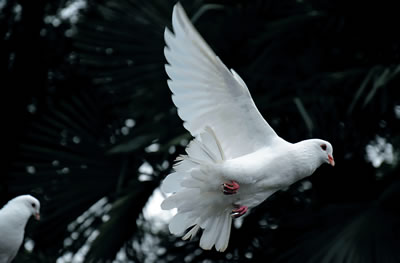
From the Director
“Seek no further concerning God; for those who wish to know the great depth (of God) must first learn about creation.” St. Columban.
Like other early Irish saints, finding God in creation came naturally to St. Columban. Many legends grew up around him in at the monastery he founded in Luxeuil in northeast France. Squirrels and doves were pictured playing in the folds of his cowl. Birds also approached him and nestled in the palms of his hands. Even wild beasts obeyed his commands.
 St. Columban’s biographer, the monk Jonas, relates how St. Columban once withdrew to the forest in order to fast and pray. The food ran out and all he and the young monk Chagnoald had to eat were crab apples. However, when Chagnoald went to collect the apples he found a hungry bear eating them. He returned to St. Columban for directions. St. Columban ordered him to go back to the orchard and to divide it in two halves, one for the bear and one for the monks.
St. Columban’s biographer, the monk Jonas, relates how St. Columban once withdrew to the forest in order to fast and pray. The food ran out and all he and the young monk Chagnoald had to eat were crab apples. However, when Chagnoald went to collect the apples he found a hungry bear eating them. He returned to St. Columban for directions. St. Columban ordered him to go back to the orchard and to divide it in two halves, one for the bear and one for the monks.
In today’s world, we struggle to find the face of God amongst a creation being exploited not for need but for profit. There are many who interpret the biblical verses of Genesis in which God gives humankind the right to “rule over” (Gen 1:26) and “subdue” (Gen 1:28) nature as a free license to do whatever humankind desires from the earth. Yet, the creation texts clearly state that humankind is created in God’s likeness. Although humankind is given the right rule and subdue the creatures of the earth, God also reminds humankind that it must share “every green plant as food” with other creatures (Gen 1: 29-30). Rule and subdue shouldn’t be understood in modern terms but from the biblical understanding that we are to imitate God’s characteristics of creating life and governing with love and peace with all other creatures.
Rule and subdue shouldn’t be understood in modern terms but from the biblical understanding that we are to imitate God’s characteristics of creating life and governing with love and peace with all other creatures.
The example of St. Columban sharing the crab apples with the hungry bear highlights this understanding. The bear’s hunger is not secondary to human hunger. It is equal to. This relationship between humankind and rest of creation continued to be expressed by many spiritual writers over the ages. Centuries after St. Columban, St. Thomas Aquinas expressed the following: “God brought things into being in order that his goodness might be communicated to creatures and be represented by them; and because his goodness could not be adequately represented by one creature alone, he produced many and diverse creatures so that, what was wanting to one in the manifestation of the divine goodness, might be supplied by another, … and hence the whole universe together participates in the divine goodness more perfectly, and represents it better, than any single creature whatsoever”. (Summa Theologica Part 1, Question 47, article 1).
Believing that we, humankind, are above creation is absolute folly. We were commissioned by God to be responsible stewards to creation. To live in peace and harmony with creation. This issue of Columban Mission highlights the efforts of many missionaries to recognize God’s face in all forms of creation.